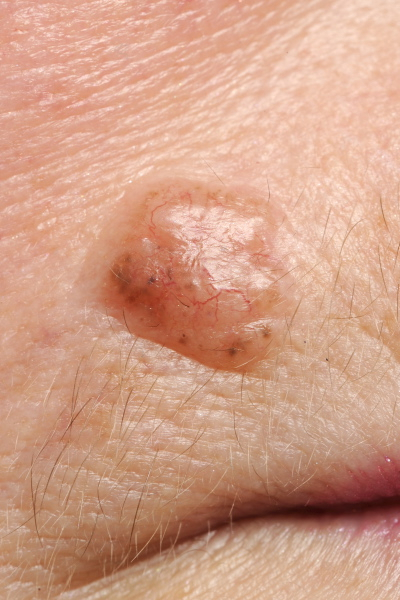What Are the Signs of Basal Cell Carcinoma?

Basal cell carcinoma symptoms vary, but key features include:
- A smooth or raised lump
- A shiny, pearly or translucent surface
- A sore that bleeds, crusts over, then returns
- A scab that never fully heals
- A painless ulcer that slowly enlarges
BCCs most commonly appear on sun-exposed areas such as the face, neck, and scalp.
Causes of Basal Cell Carcinoma
Effective prevention begins with reliable information on basal cell carcinoma, including awareness of key risk factors. BCCs develop when the skin’s basal cells are damaged, most often by ultraviolet (UV) radiation. This damage may have occurred decades earlier.
Risk factors for BCC include:
- Fair skin that burns easily
- Long-term sun exposure (especially without protection)
- Outdoor occupations or hobbies (e.g. golf, gardening, cricket)
- Living abroad in sunny climates
- History of sunbed use
- Rarely: arsenic exposure, burns, or old scars
Why Is Treatment Necessary?
Although BCCs are rarely life-threatening, they can grow deep into surrounding tissues if untreated. Over time, they may disfigure nearby skin, cartilage, or bone which is why early basal cell carcinoma treatment is strongly recommended.
Early treatment prevents:
- Local destruction of healthy tissue
- Complicated surgical repairs
- Longer healing times
- Cosmetic concerns
Basal Cell Carcinoma Treatment in Sussex: Options We Offer
BCCs are typically curable, and most can be removed using minor procedures. Treatment is tailored to the lesion’s type, size, depth and location. Your dermatologist will discuss the best approach for you.
Cryotherapy and Curettage
- Used for small, superficial BCCs
- Freezing with liquid nitrogen followed by gentle scraping
- Quick healing with minimal scarring
Surgical Excision
- Standard treatment for most BCCs
- Local anaesthetic day-case procedure
- Involves removing the lesion plus a margin of normal skin
- Skin is closed with stitches; the sample is checked by a pathologist
- Results are typically issued within two weeks
Mohs Micrographic Surgery
- Highly specialised technique for complex or recurrent BCCs
- Commonly used on the face, scalp and ears
- Offers highest cure rate with minimal tissue removal
- Available at select UK centres
Photodynamic Therapy (PDT)
- Suitable for large or multiple superficial BCCs
- Light-activated cream selectively destroys abnormal cells
- Offers excellent cosmetic outcomes with short healing time
All treatments are delivered by experienced Consultant Dermatologists as part of our basal cell carcinoma treatment in Sussex service.
Do I Need Ongoing Care?
Patients who undergo skin surgery are usually discharged after a pathology report checks the diagnosis and confirms complete removal. Those treated with non-surgical methods may have follow-up reviews to check results or manage side effects.
Will I Get More Basal Cell Carcinomas?
Once you’ve had a BCC, your risk of developing another is around 30% over the next five years. If you’ve had multiple BCCs before, that risk is higher.
We recommend:
- Carrying out regular skin checks at home
- Booking a prompt review for any new or changing lesions
- Attending annual or twice-yearly skin reviews if you’re high risk
You can book directly with us — no GP referral is needed.
How Can I Help Prevent Future Skin Cancer?
Sun protection is the best way to reduce your risk of skin cancer. Helpful strategies include:
- Wearing a wide-brimmed hat and long-sleeved clothing outdoors
- Avoiding sun exposure during peak hours (11am–3pm)
- Applying broad-spectrum SPF 30+ sunscreen daily
- Choosing moisturisers with SPF 15+ as part of your routine
- Avoiding sunbeds entirely
These tips are essential for prevention and helpful for patients seeking reliable basal cell carcinoma facts and aftercare guidance.
Book Your Basal Cell Carcinoma Treatment in Sussex
If you have a non-healing patch, shiny lump, or recurring scab, don’t wait. Early care can prevent long-term damage and improve cosmetic results.
Our Consultant Dermatologists provide expert, evidence-based basal cell carcinoma treatment in Sussex, with fast access and personalised advice.
Contact us today to book your consultation and receive trusted basal cell carcinoma patient information, diagnosis, and treatment.
